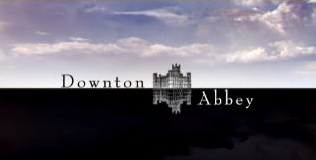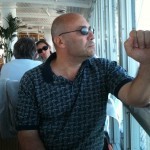Massimo Marino's Blog: The Ramblings and the Rumblings, page 15
October 30, 2014
Getting Personal … with Author Michael Smith
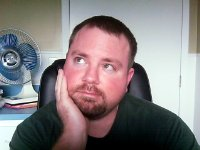 Today we’re here to discover a YA fantasy writer, Michael Smith, author of The Road to Ascendance
Today we’re here to discover a YA fantasy writer, Michael Smith, author of The Road to Ascendance . As the author says, it’s a saga “with heroes and nightmare foes, themes of morality, religion, self-sacrifice, and the value of sentient life permeating each choice, each conflict, each miracle.”
. As the author says, it’s a saga “with heroes and nightmare foes, themes of morality, religion, self-sacrifice, and the value of sentient life permeating each choice, each conflict, each miracle.”
Michael holds a bachelor’s degree in Biochemistry and a master’s degree in Biology Education. For the last 12 years he has worked for a company that manufactures educational hardware and software that helps individuals with Attention Deficit Disorder focus more effectively. In his spare time, Michael writes fiction novels and practices/teaches Mixed Martial Arts. Don’t make him mad 
So, welcome to Getting Personal, Michael. How do you feel about being interviewed?
At first I thought there were WAY too many questions. But I’m drunk right now, so I’m cool with it.
Ah, didn’t I tell you had to choose from the questions I sent you? Sorry ’bout that. Must have been a senior moment. You’ve a few books under your belt, Michael—more later—what is the single most powerful challenge when it comes to writing a novel?
Accepting that fact that you suck when you first start. But the good thing is, you never know you suck when you first start, so I guess the real challenge is just staying with it long enough to get good.
Isn’t that true? The only certainty about writing and trying to be a writer is that, eventually, the ego falls apart like a soaked sponge. But that’s can be a good. Those who believe their first attempts are masterpiece will always stick to that initial quality (or lack thereof). Unfortunately for the readers, Amazon published slush pile is the largest in the world. So, tell us about your first work.
It’s an epic fantasy fiction novel, The Road to Ascendance with the main protagonists being college-aged Americans from the late 1990’s who find themselves in a medieval world of magic and monsters.
with the main protagonists being college-aged Americans from the late 1990’s who find themselves in a medieval world of magic and monsters.
Is there anything you want to make sure potential readers know about it?
Aside from the fantasy elements, I think “The Road to Ascendance” is about the relationship between close siblings, and how that very specific bond affects every aspect of an individual’s life.
That’s a theme that should resonate with many readers. What else readers can find from you?
The sequels to The Road to Ascendance—Ascendance Born (Children of Ascendance Chronicles) , The Sender (Children of Ascendance Chronicles, Book 3)
, The Sender (Children of Ascendance Chronicles, Book 3) , and Lazarus’s Heir (Children of Ascendance Chronicles – Book 4)
, and Lazarus’s Heir (Children of Ascendance Chronicles – Book 4) .
.
What about the titles of your novels?
What about them???
Okaaay… next question. How much impact does your childhood have on your writing?
A huge amount, but it’s hard to quantify. I think that writing for me is a joy, but the place it comes from is one of pain. I think my current humor comes through, (almost unintentionally), but the hardships of my childhood are the driving force.
What’s your drive for writing?
It is fun for me. I’d like to tell you I write to make a living at it, but that’s never been why I do it. I would LOVE for that to be the case, but in the end, it’s all about telling the stories I want to tell… perhaps just for me.
You mentioned hardship before; writing can be difficult when all needs of all kinds are satisfied. So, what was the greatest thing you learned at school?
Critical thinking.
Let’s use that and describe for us your writing process. When and where do you write?
I start with an idea, but never outline or plan the plot. It occurs organically. And I usually write when I’m drinking.
Ray Bradbury said: “You must stay drunk on writing so reality cannot destroy you.” I’m not sure it really works for everyone but it speaks for those burning void sensations that sometimes trigger writing. What was the biggest challenge you faced writing your books, especially at the beginning, and how did you overcome it?
The biggest challenge was that I was a shitty writer. And I overcame that by writing and editing and writing and editing and so on and so forth for 10-15 years or more.
The sucking period, right? Stephen King says that before we start to write we need to have written a million words. The threshold might be different for every writer but there are things that can never be learnt if not by writing, rewriting, editing, and reediting. From your 10-15 years spent with the written word, what advice would you give to aspiring writers?
Your writing is not as good as you think it is, but it can be. It will take a SHIT TON of work and revision and editing, but if you stick with it, like any skill, you will attain mastery.
That’s a positive thought. All starts with humility and then ends up with Oscar Wilde: “The other day I spent the morning putting in a comma, and spent the afternoon taking it out.” What is your favorite genre to read?
I can’t say I lean towards a particular genre, because if the writing and the story is good, I will love it. I guess the best answer to that question is any story in which I can put myself as a character.
Then the question comes naturally: which character are you in your books?
In “Ascendance Born”, I wrote the character of “Jacob” to be me when I’m in my fifties. But, truth be told, the main protagonist of all of the “Children of Ascendance” chronicles, Michael Descado, is a braver, less crazy version of my own psyche.
And then they say reality can’t beat fiction  What is the most demeaning thing said about you as a writer?
What is the most demeaning thing said about you as a writer?
So far, I haven’t gotten any really negative feedback.
Don’t fret, it will arrive. It arrives to everyone. How do you react to a bad review of one of your books?
Haven’t had one yet.
Don’t fret, it will arrive. It arrives to everyone  Do you read reviews of your books? How do they affect you?
Do you read reviews of your books? How do they affect you?
Yes. So far all have been positive, so I’m not sure they actually “affect” me, other than as positive reinforcement.
Do you research your novels?
Yes, but only as I go along. As knowledge I don’t have is needed, I start to research.
We have a clear advantage with respect to authors of the past. Are you jealous of other writers?
I think I can say with absolute candor and certainty that “jealousy” has never been an emotion I’ve experienced while reading another writer’s work. To me, jealousy would only be possible if I thought I was incapable of reaching the same level. I mean, I’m not “jealous” of other martial artists who are faster, stronger, more skilled, etc., of me… No, I appreciate them, I learn from them, I glean knowledge from them, but being jealous? No way! I think you’d have to be a selfish fuck head to literally be jealous of something you can’t do.
That’s the right attitude. Better writers do exist, absolute best writers don’t. We all have to learn from others’ works, appreciate their skills, learn from them, digesting and become better writers ourselves. Usually it happens with reading a lot. Who are your favorite books or authors?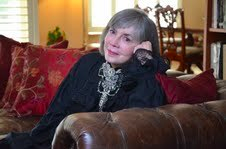
Anything written by Anne Rice or David Gemmell.
What are the most important attributes to remaining sane as a writer?
Alcohol… patience… the ability to take criticism.
It’s a lifetime learning process. And now, Michael, it’s time to Get Personal!
What do you consider your biggest failure?
The “tight jeans” phase I went through during the eighties.
Had hard time to fit in?  Are you fun to go on vacation with?
Are you fun to go on vacation with?
That depends. If certain things work out as I “need” them to, like a nice clean hotel room, and a bunch of bars on the beach within walking distance, then yes, I am the best person ON EARTH to be on vacation with. You will shit yourself laughing! But if things suck, if everything goes wrong, I will do everything I can to make it right… and if that fails, if mishap after mishap continues to happen beyond my control, there will come a threshold where I LOSE MY SHIT and just want to go home.
Because of your martial arts skills I’d have expected you to flatten the all place when you’d lost it. Just wanting to go home sounds mellow and reasonable. Speaking of which, if you were going instead to commit the perfect murder, how would you go about it?
I’ve actually written a novel about that kind of thing, and I think the easiest (most successful) method is to covertly trip your victim in such a way that they fall into incoming traffic.
I’ll walk with you only in area covered thoroughly by surveillance traffic cameras. What are you ashamed of?
I’m ashamed of every time I let my own insecurities drive me to put other people down.
How many people have you done away with over the course of your career?
Fictional people? Thousands. Real people? That’s none of your business. 
What’s the most blatant lie you’ve ever told?
When I was 7 years old, I told my mom I was abducted by aliens in the field behind my elementary school.
After all these years, you can finally admit it. You weren’t in the field behind your elementary school! Have you ever been in trouble with the police?
I got a DUI in college, and later, in my thirties, I spend a night in the drunk tank for telling an Asheville magistrate to go fuck himself.
Magistrates have no sense of humor. When were you last involved in a real-life punch-up?
I’m not sure what a “punch-up” is, but if you mean a fight, it was 3 or 4 years ago. I got into a fight with my drunken neighbor, who was being insanely belligerent. I took him to the ground and choked him unconscious. Unfortunately, while yanking him to the ground, I landed on my butt (on a concrete street) and bruised my coccyx so much that I couldn’t sit down for 3 weeks. Using the toilet was a nightmare, as it became a contest between what would yield first… my bowels, or the upper body strength I was using to hold myself over the seat.
At least you must have developed good triceps. Do you ever wish that you had an entirely uncreative job, like data entry or working in a factory?
I had a job like that, as a customer service representative in a call center. I hated it. So no, I do not wish to have an entirely uncreative job.
It’s always a surprise. It’s never pain, but emotionally heavy stuff? Well done movies or television shows? Yeah, they’ll take me off guard every once in a while. Tonight I was watching Downton Abbey, and I started to tear up. Yeah, that happened. So I guess what makes me cry is the same kind of stuff as most people, (because, ya know, that’s a popular show!)
What makes you laugh?
I like humor based on quick edits. Like something happens, and then you see an observer’s reaction for just a second, and then the scene cuts away. That stuff KILLS me!!! Also, characters acting really confident and self assured amidst an absurd situation. So they think they’re appearing intelligent, but to the observer, they look like buffoons.
Modern Family is a good television example. Excellent humor there!!!
Shock humor gets me too, though. Like, in a totally causal situation, someone says the most politically incorrect thing imaginable. Gets me every time, whether I hate myself for laughing or not.
I like politically incorrect statements. They ring true. Political correctness brought me not to believe anymore anyone’s opinion on certain topics. What’s the loveliest thing you have ever seen?
That changes all the time. Last morning, I got up early and walked around my hometown of Asheville, NC. Being late October, all the leaves are changes, and when you add that to the brisk fall breeze, it was the loveliest thing I’d ever seen.
Yes, when Nature dresses up with golds, and reds, and prepares for the winter it can be breathtaking. What is your favorite bedtime drink?
Jim Beam and caffeine free diet Pepsi.
Do you believe in a deity?
Nope.
Do you ever write naked?
Nope.
You know, that was a tricky question. Have you ever found true love?
Not since I was a teenager. I think we feel things more profoundly when we’re young. As an adult, no, I don’t think I’ve found “true love”.
I’ve been lucky. I found it when I was 18 and had been able to keep it alive. A bit like the main character in my novel Daimones : “Mary had just turned sixteen when we first met. Something of young lovers remained between us, even after thirty-two years, a twelve-year-old daughter, and life in three countries.” And now, questions in rapid succession and answers without thinking or taking a breath:
: “Mary had just turned sixteen when we first met. Something of young lovers remained between us, even after thirty-two years, a twelve-year-old daughter, and life in three countries.” And now, questions in rapid succession and answers without thinking or taking a breath:
Who would play you in a film of your life?
No idea. Seriously.
Do you laugh at your own jokes?
Yes, totally!
Do you admire your own work?
Absolutely!
How many times a day do you think about death?
Zero.
What are books for?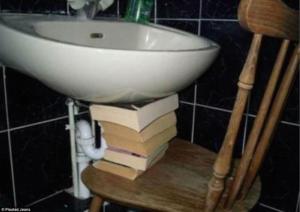
To read, silly!
Well, some are great at many other tasks. We are about to part, Michael. What do you want to be when you grow up?
I think writing full time would be awesome… until it actually happened, and people were counting on me to meet deadlines, and suddenly I’m stressed out and not writing because it’s no longer fun. So, with that I mind, I think my ideal profession, (what I’m best suited for), is a martial arts instructor.
Last question from me. Why do you think what you do matters?
I don’t think it matters at all, in the grand scheme of things… except to me, and those few lives I have the privilege to “touch” with the stuff I write. Ultimately I’m one person on a planet with 7 billion others, in a solar system among billions of others, within a galaxy among a universe with billions of other galaxies. Nothing I do truly matters, except in the almost miniscule context of my life, and the lives of those upon which I have an impact.
And last question from you 
Do I like chicken wings? Yes, I do like them.
Thanks Michael for your time and for sharing these moments with readers. I wish you a pleasant discovery path with your writing, not a track without obstacles and thorns but one that will let you grow as a writer, overcome any obstacle to your success, and learn how to not be held back by the thorns life lays on our journey.
The post Getting Personal … with Author Michael Smith appeared first on § Author Massimo Marino.
October 29, 2014
Add Symbols to Add Depth
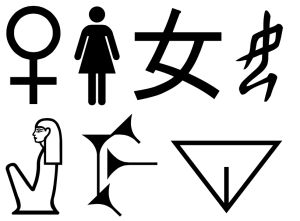 The use of symbols is one way to increase the depth of your writing. Many a doctoral thesis has been written on symbolism and there are many that still can be written. This post will only skim the surface to plant a seed, the expression ‘plant a seed’ being a symbol itself, albeit a trite one. However, symbolization is a potent tool in your writing craft kit. The word ‘tool’ here is also a symbol because is a concrete representation of a something abstract.
The use of symbols is one way to increase the depth of your writing. Many a doctoral thesis has been written on symbolism and there are many that still can be written. This post will only skim the surface to plant a seed, the expression ‘plant a seed’ being a symbol itself, albeit a trite one. However, symbolization is a potent tool in your writing craft kit. The word ‘tool’ here is also a symbol because is a concrete representation of a something abstract.
Webster defines a symbol as “something that stands for or suggests something else by reason of relationship, association, convention, or accidental resemblance; especially: a visible sign of something invisible.”
Let’s look at two different categories of symbols: “Universal” and “Private”.
“Universal” symbols
Symbols that are “universal”—or symbols understood by everyone—can be tricky. The word “universal” is in quotes because “universal” symbols break down culturally. The Universe is just too big for a symbol. This is a problem now that whatever we write is read by more than one culture. Anyone who has lived in another country, or even read literature from a previous epoch, needs a guide to understand what the symbols mean. That, if they recognize they are symbols at all.
Flower symbolism, for example, is culturally based. Chrysanthemums, the national symbol of Japan for a long life are associated with death in Italy and are used to decorate graves November 1st, the “Festa dei Morti” or Celebration of the Dead, the family that passed away. Which is also one of the reasons why Halloween had and has a difficult time in the country. However, if a person is writing about Italy they wouldn’t want an Italian man send Chrysanthemums to his lover unless he is sending her a very nasty message. If your readership is American the inappropriatness needs to be explained or shown in someway.
Color symbolism is also culturally based. White is the color that symbolizes virginity and purity which is why wedding gowns are white in Western Culture, but Indian women are married in red. Imagine the looks guests would exchange in a small English town if a bride walked down the aisle in a bright red wedding gown.
Freud and Jung both agreed certain symbols reflect the ability of the mind to hold a distinct piece of information, but they never agreed on the commonality of symbols. Ritual masks rife with all types of symbols from feathers, brushes, colors, expression. They are from all over the world. However if one had horrible pointed teeth, furrowed lines pointed down from the forehead and mouth, horns painted in black, it would probably not pass as a symbol of happiness in any culture.
An apple and snake might not mean a lot to someone who had never heard of Adam and Eve. The red coral that is seen in paintings of the Virgin Mary with Baby Jesus is there to symbolize the sacrifice (blood) that will redeem humanity, while the lion skin wore by Hercules signifies its strength. (Hall James, Dictionary of Subjects and Symbols in Art )
)
Writers, therefore, need to be careful if they use certain cultural symbols. They will have to conjure up something to trigger recognition by the target audience. In using symbols of a culture such as Welsh animal symbols (e.g. a boar for courage) it has to be made clear to the reader not familiar with the standing of boars in ancient Welsh cultures. This must be done subtly rather than with sentences such as “watch the boar appear in a chapter 5 and the hero will now do something brave in chapter 6.”
Naming characters after Roman gods might work if the readers knew Roman mythology. If they didn’t the writing would have to be strong enough to carry it without the knowledge. The author can use several symbols and hide clues for the reader to decipher. For example, in my novel Daimones , the , the name of Dan’s wife Mary, the reference to early centers of civilization, in particular the Mesopotamian city of Eridu, are key elements in the novel and they are all symbols. Furthermore, the word choice of “Palladium”, the artifact the aliens introduce the transgenic humans to as the center of knowledge: it’s a rare chemical element, which was itself named after the epithet of the Greek goddess Athena, and Athena is the great goddess of wisdom and the symbol enhances the subtle conflict of emotion, religious beliefs, and logic along with ethics. There’s enough hidden hints for the discerning reader to pick and have “ah ha” moments. For others, it will just be a cute name but you can’t ruin the “ah ha” moment to those readers explaining your symbols. Lay them there, there will be those who will pick the flowers.
, the , the name of Dan’s wife Mary, the reference to early centers of civilization, in particular the Mesopotamian city of Eridu, are key elements in the novel and they are all symbols. Furthermore, the word choice of “Palladium”, the artifact the aliens introduce the transgenic humans to as the center of knowledge: it’s a rare chemical element, which was itself named after the epithet of the Greek goddess Athena, and Athena is the great goddess of wisdom and the symbol enhances the subtle conflict of emotion, religious beliefs, and logic along with ethics. There’s enough hidden hints for the discerning reader to pick and have “ah ha” moments. For others, it will just be a cute name but you can’t ruin the “ah ha” moment to those readers explaining your symbols. Lay them there, there will be those who will pick the flowers.
This also means that writers can include culturally uncommon symbols if they are used in such a way that some readers will be given the means to understand what the writer is doing. At some level, for some. The reader who knows the symbol system will get a greater understanding of the work.
Private symbols
These are symbols that writers set up for themselves. The only limitation is the writer’s imagination. There are the easy and trite symbols. For example an expensive car represents the attainment of wealth (goals). John Grisham, when he stepped out of genre writing of legal thrillers, used the painting of his childhood home as a symbol of something important in the status of his family certainly far less trite than buying a Mercedes.
The symbol must remain constant through out the piece unless the change is clear to the reader. For example, a Mercedes can represent success but if a man loses his wife because his wife cannot support what he had to do to get that Mercedes, then it also becomes a symbol of failure. However, failure is the other side of success and therefore the symbol mutates logically into something that is related to its original meaning strengthening the power of the symbol.
The private symbol must hold on its own merit. Orwell makes good use of Pigs in Animal Farm to represent capitalists.
to represent capitalists.
Be careful, however, not to over do symbols or be too cunning which will leave a writer open for charges of precious writing.
Many writers have admitted that there are times when critics see symbols in their writing that were put in there subconsciously. Perhaps that is the best use of symbols possible.
The connections between symbol and object should be valid and reasonable in a plain literal sense as well as a metaphorical one, and be consistent through the whole story. “A knife can be a symbol, but it also better be able to cut string. And if it represent cutting free, cutting loose, in the story’s beginning, it better not be used to prop up a bookcase and then forgotten later on.” – Ansen Dibell BEYOND PLOT
PS
All symbols at the top of this post represent the concept of female and woman
Massimo Marino has a scientific background: He spent years at CERN and The Lawrence Berkeley Lab followed by lead positions with Apple, Inc. and the World Economic Forum. He is also co-founder of “Squares on Blue”, a Big Data Analytics service company.
Massimo currently lives in France and crosses the border with Switzerland multiple times daily, although he is no smuggler.
As a Scientist, he envisions Science Fiction and went from smashing particles at accelerators at SLAC and CERN to smashing words on a computer screen.
He’s the author of multi-awarded Daimones Trilogy. 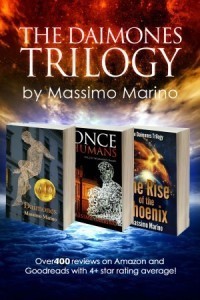
• 2012 PRG Reviewer’s Choice Award Winner in Science Fiction
• 2013 Hall of Fame – Best in Science Fiction, Quality Reads UK Book Club
• 2013 PRG Reviewer’s Choice Award Winner in Science Fiction Series
• 2014 Finalist – Science Fiction – Indie Excellence Awards L.A.
• 2014 Award Winner – Science Fiction Honorable Mention – Readers’ Favorite Annual Awards
His novels are available from Amazon, Barnes & Noble (Nook), iTunes Apple Store, and many other retailers around the world.
Join his mailing list for new releases, or follow him on Facebook, Google+, and Twitter.
The post Add Symbols to Add Depth appeared first on § Author Massimo Marino.
October 22, 2014
How to read Science Fiction
This work is licensed under a Creative Commons Attribution-NonCommercial-NoDerivs 2.0 England & Wales License.
What is SF?
Science fiction has a many definitions as there are people who want to define it.
Wikipedia says that “Science fiction is a genre of fiction in which the story depends (at least in part) upon some change in the world as we know it that is explained by science or technology (as opposed to magic).”
Robert Heinlein said that SF was “Realistic speculation about possible future events, based solidly on adequate knowledge of the real world, past and present, and on a thorough understanding of the nature and significance of the scientific method.”
My working definition of SF is closer to Theodore Sturgeon’s: “A good science fiction story is a story about human beings, with a human problem, and a human solution, that would not have happened at all without its science content.”
But best of all is Damon Knight’s: “Science Fiction is what I say it is when I point to something and say that’s science fiction.”
Like most people, we know what science fiction is and what it isn’t. So we’ll stick with Knight’s version.
What science fiction isn’t
It isn’t about squids in space, or rather, it isn’t all about squids in space. Despite my fondness for all things tentacly, SF isn’t all aliens and spaceships. A large proportion of SF never leaves the planet or encounter aliens. Perhaps fully half of the Clarke award books didn’t do either. Out of the six shortlisted books, two had no alien/space content whatsoever.
It’s not only for scientists. Sometimes I still don’t understand what’s going on, and I have two degrees. But when I was eight I didn’t have any degrees. Some SF is written by and for genre fans who know what a Singularity is, how big a Dyson sphere is, and the problems inherent with grey goo. Most is not – and any good author will take their reader along for the ride, whether it’s the first SF book they’ve picked up or the fiftieth.
It won’t turn you into a glasses-wearing übergeek or a tin-foil hat wearing conspiracy nut. That is, unless you want it to. Most readers of SF are perfectly normal, and completely harmless.
What science fiction can’t do
It can’t predict the future. If science fiction could predict the future, I’d have my flying car by now. Just from the law of averages, some SF predictions have come true, but the vast majority don’t. This is because SF authors don’t use SF to predict the future – they use it to explore it. For the very great part, they don’t like what they find. Ray Bradbury once said “People ask me to predict the future, when all I want to do is prevent it.” From Mary Shelley’s Frankenstein to last year’s Kim Stanley Robinson book, Fifty Degrees Below , SF has sought to warn people about current social trends by extrapolating them into a plausible future. SF is very much a literature of the present.
, SF has sought to warn people about current social trends by extrapolating them into a plausible future. SF is very much a literature of the present.
It can’t make up for the fact you dropped science at GCSE. Or, “Everything I know about science I learnt from SF books”. Whilst you will undoubtedly learn new stuff about science from SF books, you’ll undoubtedly learn new stuff about law from John Grisham books. But the chief part of Science Fiction is that it’s fiction. Writers make up stuff all the time. In fact, it’s the writer’s job to make you believe the untrue stuff as much as the true. In fact, we delight in making the junction between true/untrue as seamless as possible.
It won’t win the admiration of your friends, family and work colleagues: but at least with the size of some current SF novels, you can hit your detractors with a near-lethal blow. I appreciate that the latest Stephen Baxter doesn’t have the ‘look at me, I’m an intellectual’ cache of Dickens or Proust (in French, of course). But authors very rarely have any input as to what goes on the cover of their book – and book publishers seem to go in for a lurid ‘squids in space’ style of cover art that doesn’t often have anything to do with what goes on in the text.
There’s also a lot of snobbery involved – so much so that when an SF book crosses over to the mainstream, there’s a flurry of reviews saying to the effect ‘this is too good to be SF’. Even some authors are involved in this: Margaret Atwood being an easy target here. If The Handmaid’s Tale isn’t SF, we’ll have our Arthur C Clarke award back, thank you.
What science fiction can do
It can entertain you. SF is one big playground. If we can think of a decent reason to do something outrageous, we’ll do it. We can blow up planets and stars, mass thousands of spaceships, change both the past and the future, and even cheat the end of the universe. Jilly Cooper can’t do that for you.
It can make you think. One of the biggest unanswered questions is “what if?” Science Fiction is all about “what if?”, and SF stories are deliberately told to explore the possibility of, whatever – time travel, genetic engineering, computers in people’s heads, teleportation, what happens when the oil runs out, what do we do if we’re contacted by aliens. If more politicians read SF, we wouldn’t be in half the messes we’re in now.
It can give you a whole new set of stuff to worry about. From nanotechnology turning the planet into grey goo, through giant asteroids delivering a civilisation-killing blow to the Earth, to a genetically engineered plague wiping out all life, we have it all. Highly advanced aliens coming to destroy us all. Global climate change. World-spanning repressive dictatorships. Wars without end. Clones. Cybernetics. Intelligent machines. It beats lions and tigers and bears, oh my, into a cocked hat.
We also get to pity those poor souls who don’t know what they’re missing. It’s good to feel superior. Science fiction is often smart fiction – sassy, intelligent, forward-looking. And so will you be when you read it.
Yes, there are different types of science fiction
SF isn’t a monolith – it’s a multi-faceted jewel. No, honest…
Alternate history – Change on point of history. PK Dick, Man in the High Castle. Almost anything by Harry Turtledove. Kim Stanley Robinson, The Years of Rice and Salt
Cyberpunk – high-tech low-life. Neal Stephenson, Charlie Stross, William Gibson, Pat Cadigan
Military SF – soldiers in space. Robert Heinlein, Starship Troopers. Joe Haldeman, The Forever War, Orson Scott Card, Ender’s Game
Post-apocalypse – Nevil Shute, On the Beach. Philip Reeve, Mortal Engines. John Wyndham, Day of the Triffids, The Chrysalids.
Authors of ‘Literature’ who have written science fiction
A brief and inexhaustive list of some literary toffs who’ve been seen slumming it in the genre gutter:
Douglas Coupland – Girlfriend in a Coma

Margaret Atwood – The Handmaid’s Tale

PD James – The Children of Men

Kasuo Ishiguro – Never Let Me Go
If you like…
Family sagas, try Julian May’s Pleistocene Saga. Four books set in prehistoric times plus another three in the future. May’s work is fantastically detailed and follows one family through a magnificently epic story.
Detective stories – Hardly anyone does SF/detective stories like Jon Courtney Grimwood: his earlier Arabesk books can be followed by his 2005 novel, 9Tail Fox
Technothrillers. Is Clancy your man? Then get a load of Alaistair Reynolds’ Revelation Space and Pushing Ice. More tech that you can shake a stick at.
‘Literature’. Not straying too far from the shore? The winner of the 2005 Arthur C Clarke Award, Geoff Ryman, will soon land you in deep water. Air is everything a lit book needs to be.
Gothic novels your thing? China Mieville is the writer of choice. Look no further than Perdido Street Station and The Scar
Politics, anyone? Everyone’s favourite Scottish Libertarian Socialist, Ken MacLeod, writes mean SF often with a political riff. Try The Cassini Division, or Learning the World
Comedy: Douglas Adams, Hitchhiker’s Guide to the Galaxy. Nuff said.
SF books you ought to read
HG Wells – The War of the Worlds

Wells’ classic novel of alien invasion, published in 1898, has three-legged Martian war-machines crushing the most technologically advanced culture on Earth – the British – with the survivors hiding from a fate worse than death in the rubble of London.
Orwell’s political masterpiece is set in a dystopian future of Big Brother, Newspeak and thought police. Winston Smith is the lone dissident whose job is to rewrite the past to fit in with the Party’s ideology. First published in 1949, it has had a huge cultural impact in the English-speaking world.
Frederick Pohl and Cyril Kornbluth – The Space Merchants

Satire wasn’t born with the election of Margaret Thatcher – Pohl and Kornbluth’s razor-sharp filleting of global capitalism in general and the advertising industry in particular dates from 1953, and shows a future dominated by overpopulation, resource shortages, and an imminent land grab for Venus.
1953 turned out to be a golden year for science fiction: Bradbury’s gentle, luminous writing illuminates this tale of Montag the fireman, paid to burn books. Disillusion with his homelife, friendship with young Clarisse, and his encounter with a bookhoarder finally turn force him to read. Almost everything by Bradbury is brilliant – but this is the only book he would ever admit to being science fiction.
Forget the slightly dodgy film, Dune is a complex, multi-layered story revolving around a chemical called ‘spice’, which makes space travel possible, and is found on only one planet in the galaxy. Whoever controls the spice, controls the Imperial throne. Throw in human computers, giant sandworms, treason, espionage and healthy dollop of mysticism, and this 1965 book never fails to deliver.
Larry Niven and Jerry Pournelle – The Mote in God’s Eye

This 1975 novel of first contact with aliens is not without it’s flaws – the authors are much more concerned with the science and the aliens than they are with the human society they depict – but where they score is with the aliens: the Moties are some of the strangest, most tragic creatures ever to live within a book. The finale is both poignant and full of hope.
Joe Haldeman – The Forever War

Published in 1975, Vietnam vet Haldeman writes a elegy to his generation: super soldier William Mandella crosses both space and time, and becomes increasingly detached from the civilisation he’s supposed to be defending, until relativistic effects strand him and the surviving soldiers a thousand years in the future.
With the first sentence of ‘The sky above the port was the color of television, tuned to a dead channel’, Gibson crafts a startling and disturbing future where cyberspace (a term he coined, along with ‘The Matrix’) is more real than reality, and it’s where more than information that wants to be free. All the more amazing for having been written on a manual typewriter in 1984.
Orson Scott Card – Ender’s Game

This controversial book, first published in 1985, is set in the middle of an interstellar war against the hive-mind Buggers. Children are taken by the military and trained to fight the enemy – and none is more brilliant and ruthless that Andrew ‘Ender’ Wiggin. The psychological depth and sharp social insight make this book a genre classic.
It’s the end of the world as we know it – enigmatic, unknowable aliens have done something to the planet and it’s counting down to disaster. Humanity, however, is not friendless. This is wide-screen, effects-laden fiction, and it gave me memorable and terrifying nightmares. Well worth it, I say! (1987)
Mary Doria Russell – The Sparrow

The Sparrow was the winner of the 1996 Arthur C Clarke Award, involving a complex alien culture on a planet orbiting Alpha Centauri and the Jesuit mission which makes contact with them. It is a deeply affecting story of faith and humanity which produces as many questions as it does answers.
Michael Marshal Smith – Spares

An alcoholic veteran of one of the most bizarre wars ever fought falls foul of a rich and powerful gangster – and hides out working as a guard on a Spares farm where all the rich and powerful gangsters keep their clones ready for the day when they need a new organ or two. Savage, funny, passionately angry, Spares is a sharp, gritty book full of surprises. (1996)
Simon Morden is the author of “Heart”, “Another War” and the forthcoming “The Lost Art”, as well as the short story collections “Thy Kingdom Come” and “Brilliant Things”. He is editor of the British Science Fiction Association’s writers’ magazine, “Focus”, and was a judge for the 2006 Arthur C Clarke Awards.
Published under a Creative Commons license – Simon Morden 2006
The post How to read Science Fiction appeared first on § Author Massimo Marino.
Mobsters, Monsters & Nazis
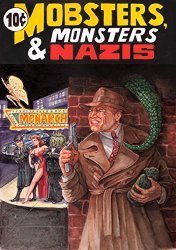
 Well, the time has come to announce Dan O’Brien’s latest project: Mobsters, Monsters & Nazis: a collaboration between Dan O’Brien and Steve Ferchaud, who illustrated Conspirators of the Lost Sock Army and the Loose Change Collection Agency.
Well, the time has come to announce Dan O’Brien’s latest project: Mobsters, Monsters & Nazis: a collaboration between Dan O’Brien and Steve Ferchaud, who illustrated Conspirators of the Lost Sock Army and the Loose Change Collection Agency.
What I am revealing today is the sketches for some of the interior illustrations (which will be black and white) of the first issue. It will be released as six issues (eBooks) starting on Halloween. It is influenced by film noir, pulp comics, and an abiding love of Lovecraft.
Now available for pre-order and the Author would love to hear what you think of it so far!
and the Author would love to hear what you think of it so far!
Comment here and visit him at: http://thedanobrienproject.blogspot.com/ or on Twitter, @AuthorDanOBrien
The post Mobsters, Monsters & Nazis appeared first on § Author Massimo Marino.
October 19, 2014
Getting Personal … with Simone Pond
 This beautiful girl smiling at you from the page is Author Simone Pond.
This beautiful girl smiling at you from the page is Author Simone Pond.
In 2013, Pond released The City Center , the first book in her dystopian fiction series. A fast-paced tale of love and adventure that will appeal to young adults and seasoned readers alike. The City Center is a bestseller in Amazon’s post-apocalyptic science fiction category and was the recipient of a gold medal award from Reader’s Favorite.
, the first book in her dystopian fiction series. A fast-paced tale of love and adventure that will appeal to young adults and seasoned readers alike. The City Center is a bestseller in Amazon’s post-apocalyptic science fiction category and was the recipient of a gold medal award from Reader’s Favorite.
The second book in the series, The New Agenda , was published in May of 2014, and a third, The Mainframe, is scheduled to be released in December.
, was published in May of 2014, and a third, The Mainframe, is scheduled to be released in December.
As a young girl, Simone always loved writing in her journal and making up stories, but after reading S.E. Hinton’s The Outsiders , everything changed. Amazed that a woman could write so convincingly from a teenage boy’s perspective, Pond became determined to become a writer as well.
, everything changed. Amazed that a woman could write so convincingly from a teenage boy’s perspective, Pond became determined to become a writer as well.
So, welcome, Simone, to Getting Personal. It’s a pleasure to have you with us, today. To the readers, Simone and I met because our novels have received an Award at the 2014 edition of the Readers’ Favorite International Book Awards.
Simone, you’re writing the third book in the “New Agenda Series” in time for the holidays, I believe. So, how many books have you written, and which one is your absolute favorite?
In this current series, I’ve written three books and there will probably be more. I loved writing the second book, The New Agenda, because it’s from the bad guy’s perspective.
Refreshing change from the hero’s point of view. I bet you had lots of fun being nasty 
What is the single most powerful challenge when it comes to writing a novel?
Sitting down to write. Once I’m there, it’s great, but getting in the chair sometimes requires a lot of mental cheerleading.
I can relate. I’m writing my fourth novel at the moment but I won’t be able to hit holidays. The myth of the inspiring muse sitting, invisible, near the writer and whispering the words is… a myth. It’s hard work, discipline, and lots of self-doubts. Do you research your novels?
I spend at least a month developing my main character. I use a fantastic book called Wired for Story to help me dig deep. Then I spend a good chunk of time outlining the story beats. They always change, but I like having a road map before I get started. While I’m writing I have to do a lot of research on how things work. If the NSA every tracked my search history, they’d think I was a terrorist.
to help me dig deep. Then I spend a good chunk of time outlining the story beats. They always change, but I like having a road map before I get started. While I’m writing I have to do a lot of research on how things work. If the NSA every tracked my search history, they’d think I was a terrorist.
We don’t want details here, I think NSA might be watching. What are the most important attributes to remaining sane as a writer?
Realizing you’re insane. Anyone who spends that much time up in their head with make believe people must be crazy.
We hear voices, and our minds conjure visions. Writing is probably the only accepted form of madness in our society. It allows to call ourselves ‘creatives’ instead of meeting with a shrink twice a week. What is your favorite genre to read?
Speculative fiction. Dystopian fiction.
Do you have any favorite books or authors?
This changes all the time, but at the moment I love Margaret Atwood and Suzanne Collins.
I wonder why…  What’s your drive for writing?
What’s your drive for writing?
I love making stuff up.
…and how do you react to a bad review of your stuff?
I read bad reviews for my favorite authors. If the most amazing authors get bad reviews, I’ll be okay.
The perfect story will never be written. The only things that will touch every reader are the usual cliché of taxes and death. Every immortal classic novel has its own load of naysayers and comments lambasting the author and the readers who loved the story. Books are like mines, with gems hidden that can be found by certain readers at certain moments. And each mine is not for every miner. So, is there anything you want to make sure potential readers know?
I love hearing from my readers, but only the nice ones.
Ahh, if only, Simone, if only  What are books for you?
What are books for you?
For me, they can be a great escape. I love sinking into the pages of a novel and forgetting the world around me, especially when the story is so good I keep telling yourself I’ll be okay on four hours of sleep, or maybe three, two is good enough . . .
They can be. A book is a space and time machine. We see and hear things, live out of this world experiences, visit times and places, and planets (with science fiction.) And what do you get from being a novelist?
My back and shoulders are in constant knots.
That’s a kind of occupational hazard. I wonder whether we could apply to Social Security support. Have you ever read or seen yourself as a character in a book or a movie?
I sprinkle parts of me throughout all of my characters. I especially like acting out through them.
It’s part of the insanity thing we mentioned before. A writer keeps an inner child alive and kicking. What do you want to be when you grow up?
I have to grow up?
Not at all, I fear we’d stop writing when that’ll happen. Are you fun to go on vacation with?
Probably not.
I wonder why. Your picture shows someone anyone would like to go on vacation with  To hear your stories, of course. Have you ever found true love?
To hear your stories, of course. Have you ever found true love?
Many times and each time it ended poorly.
Oups, how poorly? So, if you were going to commit the perfect murder, how would you go about it?
I’d get them to do it for me.
We are all wondering who you’re referring to with that ‘them.’ Are they expensive? Never mind, NSA is watching. Since we are in the theme, how many times a day do you think about death?
At least five times.
I wonder whether you keep track of those thoughts for your novels… Death and dystopia seem to be inseparable. On the other side of the spectrum, what’s the loveliest thing you have ever seen?
Sunset from the top of Meditation Mount in Ojai, CA.
With this picture of serenity, it’s time to thank you, Simone, for your visit and all the best for your imminent release of the third novel in the New Agenda Series.
Check Simone Amazon Author’s Page to purchase her novels, or visit: simonepond.com
to purchase her novels, or visit: simonepond.com
Pond currently lives in Los Angeles with her husband and their Boston Terrier. Learn more about her and her writing at www.simonepond.com.
The post Getting Personal … with Simone Pond appeared first on § Author Massimo Marino.
October 16, 2014
The Birth of a Novel
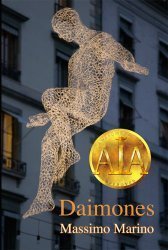 A few days ago, I was asked to share the truth about the birth of a novel, my novel. The interviewer suspected that what is narrated in the novel came from real life experiences. She said, “there are things that are difficult to invent.” She’s not wrong. They must be suffered first to become a fiction later, the truth within the many lies that make up
A few days ago, I was asked to share the truth about the birth of a novel, my novel. The interviewer suspected that what is narrated in the novel came from real life experiences. She said, “there are things that are difficult to invent.” She’s not wrong. They must be suffered first to become a fiction later, the truth within the many lies that make up  a story.
a story.
Daimones was born as autobiographical notes to throw out what hurt inside. The novel was born, in fact, it came off as a rash during a weekend in which I found myself on a Sunday night — or rather a Monday morning — staring at more than 15,000 words written on over forty pages on my Word document. After that, it has become a novel, first, and a trilogy along the way.
was born as autobiographical notes to throw out what hurt inside. The novel was born, in fact, it came off as a rash during a weekend in which I found myself on a Sunday night — or rather a Monday morning — staring at more than 15,000 words written on over forty pages on my Word document. After that, it has become a novel, first, and a trilogy along the way.
I’ve always written stories since childhood, but I didn’t allow anyone to read them. With my studies in Physics, writing has suffered, diminished, then professional work arrived and I thought everything had died off, until the day I started to invent bedtime stories for my daughter. Always a different one every night, about the boy who becomes a dolphin, the mouse whose tail’s too long, or the flower that was a girl, and she fell asleep happy.
In 2011 I suffered from what happens to Dan. I found myself having too much time to think, to doubt, to hope. It is said that you can’t write when comforts and satisfactions surround you. I think it’s true. Something must be missing inside before something can grow to fill the void and worth to share.
Massimo Marino has a scientific background: He spent years at CERN and The Lawrence Berkeley Lab followed by lead positions with Apple, Inc. and the World Economic Forum. He is also co-founder of “Squares on Blue”, a Big Data Analytics service company.
Massimo currently lives in France and crosses the border with Switzerland multiple times daily, although he is no smuggler.
As a Scientist, he envisions Science Fiction and went from smashing particles at accelerators at SLAC and CERN to smashing words on a computer screen.
He’s the author of multi-awarded Daimones Trilogy. 
• 2012 PRG Reviewer’s Choice Award Winner in Science Fiction
• 2013 Hall of Fame – Best in Science Fiction, Quality Reads UK Book Club
• 2013 PRG Reviewer’s Choice Award Winner in Science Fiction Series
• 2014 Finalist – Science Fiction – Indie Excellence Awards L.A.
• 2014 Award Winner – Science Fiction Honorable Mention – Readers’ Favorite Annual Awards
His novels are available from Amazon, Barnes & Noble (Nook), iTunes Apple Store, and many other retailers around the world.
Join his mailing list for new releases, or follow him on Facebook, Google+, and Twitter.
The post The Birth of a Novel appeared first on § Author Massimo Marino.
October 13, 2014
How Much Do Authors Really Earn?
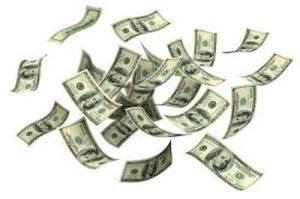 “It doesn’t help authors to say that 70% of the book market is in print if only a small fraction of that money ends up in authors’ pockets. What we want to see is the combined effect of royalty rate, sales volume, and sale price. These three factors combine to give us a true picture of comparative earnings, as shown in our pie charts” says Hugh Howey, founder of Author Earnings.
“It doesn’t help authors to say that 70% of the book market is in print if only a small fraction of that money ends up in authors’ pockets. What we want to see is the combined effect of royalty rate, sales volume, and sale price. These three factors combine to give us a true picture of comparative earnings, as shown in our pie charts” says Hugh Howey, founder of Author Earnings.
A Fantastic Report About Author Earnings
He explains: “Sports stars, musicians, actors— their salaries are often discussed. This is less true for authors, and it creates unrealistic expectations for those who pursue writing as a career. Now with every writer needing to choose between self-publishing and submitting to traditional publishers, the decision gets even more difficult. Online Book Retailers, such as Barnes&Noble or Amazon don’t share their e-book sales figures.”
Website for Authors, by Authors
Author Earnings, a website by authors and for authors looks at independent authors, small/medium publishers, Amazon published, Big Five published and uncategorized Single-Authors. The purpose is to gather and share information so that writers can make informed decisions. Another mission is to call for change within the publishing community, for better pay and fairer terms in all contracts.
Some of the Findings
• Big-5 publishers are massively reliant on their most established authors – for 63% of their e-book revenue.
• Roughly 46% of traditional publishing’s fiction book dollars are coming from e-books.
• In absolute numbers, more self-published authors are earning a living wage today than Big-5 authors.
• Readers are interested in both: the quality of a book and the price
• Very few authors who debut with major publishers make enough money to earn a living—and modern advances don’t help.
Publishing in Print or Digital – or Both?
Author Earnings: “How much money is being spent on print overall and how much on Amazon’s digital storefront? Before we got to money, we looked at actual unit sales, which came out to be 61% digital and 39% print. That’s a total different picture, comparing versions at a retailer that sells both: ebooks and print books.”
These, so far, eight extensive reports – chock-full with charts, explanations and publishing tips – are a valuable resource for every author.
Reblogged via How Much Do Authors Really Earn? | Savvy Writers & e-Books online.
The post How Much Do Authors Really Earn? appeared first on § Author Massimo Marino.
October 8, 2014
The Dreaded Writers Block
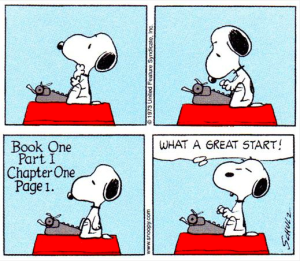 Writers who claim writers block doesn’t exist, never had it. Those who have spent days, weeks, and months not being able to put their thoughts down on paper, know it exists.
Writers who claim writers block doesn’t exist, never had it. Those who have spent days, weeks, and months not being able to put their thoughts down on paper, know it exists.
There isn’t a writer in the world who hasn’t had problems—at one time or another—finding the right word or idea.
Those who write columns for newspapers, corporations press releases or do other commercial writing cannot tell their bosses they are ‘blocked’. Produce your lines or get fired.
However, fiction writers have the “luxury” of being blocked.
For the sake of clarity, let’s define writers block as a prolonged period of not being able to produce any satisfactory writing.
Sometimes, writing is an impossible and daunting task: depression, personal tragedis, exhaustion from over-work, stress, family problems, losses (of all kinds), are all reasons for the block, although some people take refuge in writing exactly during those times. For those who don’t, remembering the struggles and problems is a good source of writing in the future.
Writers tend to lack confidence to start with—much easier than finding inspiration—so any slowness in producing the quality of work they desire, becomes a self-fulfilling prophecy. “I didn’t write well yesterday, hence I won’t write well today or tomorrow.” Panic follows.
What are some of the things to correct writers block? Let’s split them into two parts. One is avoidance of writing: you run from paper, pencil, computer. The second is freezing, what to do when you sit with pencil or keyboard in hand and stare at the blank page.
Avoidance
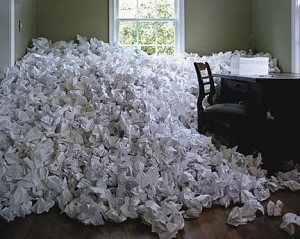 a) Examine what is going on in your life. If it’s a bad period, accept it and live the emotions. It is difficult to work on a comedy if your spouse just walked out on you. (Although Ephron wrote Heartburn
a) Examine what is going on in your life. If it’s a bad period, accept it and live the emotions. It is difficult to work on a comedy if your spouse just walked out on you. (Although Ephron wrote Heartburn under exactly those circumstances making it a great revenge novel.)
under exactly those circumstances making it a great revenge novel.)
b) Take a break. Accept that this won’t be a productive period, and do some of the things that writing has made you postpone: a holiday, paint the house, the fence, whatever.
c) Exercise that allows thinking time: walking, running on a tread mill, biking.
d) Talk to others who have had the same problem.
e) Socialize with people that will stimulate ideas.
f) Go to a movie, play, museum to stimulate yourself.
g) Do something totally different from your normal.
h) Be flexible. This is not the time for rigid writing schedules or forced discipline. It’s a guaranteed set up for more failure.
Freezing
1.) Make a list of things you might want to write, or things you don’t want to write about.
2.) Copy something you wrote before.
3.) Copy something your favorite writer wrote.
4.) Free write. Put your pen to paper or your hand to your keyboard and write anything, no matter how nonsensical. Example: James smiled but why because he wanted to but why should he and that’s stupid stupid stupid stupid…etc.
5.) Edit something you wrote earlier.
6.) Edit something another writer wrote.
7.) Write about your writers block.
8.) Talk with other writers who have suffered from writers block.
9.) Draw a scene, no matter how limited your drawing talent is. There is something in the act of drawing that works well with writing.
and, important to keep it in mind:
10.) Give yourself permission to write badly.
Know that it happened and happens to anyone. These excerpts are from Anne Lamott’s Bird by Bird: Some Instructions on Writing and Life .
.
“Writers block is going to happen to you. You will read what little you’ve written lately and see with absolutely clarity that it is total dog shit…We have all been there, and it feels like the end of the world. It’s a little like a chickadee being hit by an H-bomb.”
Here she makes a suggestion about what a writer can do: “When you don’t know what else to do, when you’re really stuck and filled with despair and self-loathing and boredom, but you can’t just leave your work alone for a while and wait, you might try telling part of your history—part of a character’s history—in the form of a letter. The letter’s informality just might free you from the tyranny of perfectionism.”
Read this as she encourages our own voices: “All good stories are out there waiting to be told in a fresh wild way. Mark Twain said that Adam was the only man who, when he said a good thing, knew that nobody had said it before. Life is like a recycling center, where all the concerns and dramas of humankind were recycled back and forth across the universe. But what you have to offer is your own sensibility, maybe your own sense of humor or insider pathos of meaning. All of us can sing the same song, and there will still be four billion different renditions.”
Remember why you write: “[...] sometimes when my writer friends are working, they feel better and more alive than they do at any other time. And sometimes when they are writing well, the feel that they are living up to something. It is as if the right words, the true words, are already inside them and they just want to help them get out. Writing this way is a little like milking a cow: The milk is so rich and delicious and the cow is glad you did it.”
And this is the ultimate goal that we strive to reach, but like the perfect game of golf, it happens rarely. Just be glad when it does, and smile when the perfect shot arrives. It does.
If anyone had any other ideas, I would love to hear them.
Massimo Marino has a scientific background: He spent years at CERN and The Lawrence Berkeley Lab followed by lead positions with Apple, Inc. and the World Economic Forum. He is also co-founder of “Squares on Blue”, a Big Data Analytics service company.
Massimo currently lives in France and crosses the border with Switzerland multiple times daily, although he is no smuggler.
As a Scientist, he envisions Science Fiction and went from smashing particles at accelerators at SLAC and CERN to smashing words on a computer screen.
He’s the author of multi-awarded Daimones Trilogy. 
• 2012 PRG Reviewer’s Choice Award Winner in Science Fiction
• 2013 Hall of Fame – Best in Science Fiction, Quality Reads UK Book Club
• 2013 PRG Reviewer’s Choice Award Winner in Science Fiction Series
• 2014 Finalist – Science Fiction – Indie Excellence Awards L.A.
• 2014 Award Winner – Science Fiction Honorable Mention – Readers’ Favorite Annual Awards
His novels are available from Amazon, Barnes & Noble (Nook), iTunes Apple Store, and many other retailers around the world.
Join his mailing list for new releases, or follow him on Facebook, Google+, and Twitter.
The post The Dreaded Writers Block appeared first on § Author Massimo Marino.
October 2, 2014
Writer’s Doubt Syndrome – WDS
 In these last years, I met with many developing writers (aren’t we all). Some have found agents and publishers, others are not even looking for such an experience and swear for the independent publishing revolution. Some us have been offered publishing contracts and refused to sign the constraining clauses.
In these last years, I met with many developing writers (aren’t we all). Some have found agents and publishers, others are not even looking for such an experience and swear for the independent publishing revolution. Some us have been offered publishing contracts and refused to sign the constraining clauses.
No matter where the writers are in their development, everyone I’ve known has expressed major doubts in their ability, with different degrees of doubts. Even writers whose works sell well are haunted by the saying that “you’re only as good as your last novel.” Each new book is a source of more doubting.
Even though your novels had been finalist in contests, or been awarded at some, even if ten times more readers than the previous year get lost in the worlds you create, you know there are writers who have ten times, hundred times, a thousand times more readers than you do. And the burning questions strikes you: “Those are writers, hence I’m not!”
When I write, I always reach an impasse on the novel I’m working on at the moment and wonder about my own ability to continue. It dawned on me that every good writer I have ever known imagines they lack ability. Even those considered immortal writers.
When I lived in the US, I marveled at the TV commercials from car dealers, or from those layers selling their services to people injured from the most incredible accidents, “Let Me Help You Sue Them!”
I can see in my mind a TV ad showing a person at the computer against a beautiful outdoor background — like the Alps mountains I see from mine — saying “Are you worried about the order of your sentences, your description, your plotting? Do you sit at your computer and switch to computer games or Facebook rather than putting words down? Then you probably have Writer’s Doubt Syndrome (WDS) and you need blah blah medicine. Ask your doctor. Not recommended for… and side effects can include brain damage, heart stoppage, carpal syndrome, publishers’ rejections, etc.”
Although I might deplore everything being made a syndrome in the US requiring the purchase of miraculous medicines, it doesn’t mean that people don’t have real problems.
WDS seems to be a requirement for every writer from the person setting down their words for the first time to someone already published.
Similar doubts are not suffered by non artistic professions. Truck drivers don’t wake up in the morning in a sweat thinking they might not be able to turn the wheel exactly the best way possible, and I doubt plumbers anguish over the installation of a water faucet and install it over and over again, the same way a writer will rewrite and rewrite a paragraph.
I’m not talking about writer’s block here, Truman Capote had the block and couldn’t write for years. People with WDS can still write, but they just don’t like what they put on paper. Sadly, like other syndromes there is no pill for it.
What can we do about it when WDS strikes? First, remind yourself you are not alone. Then try and figure out what triggered the attack.
For some, the most common trigger was a rejection. Rejections are part of writing but in our new digital publishing era this might be less of a problem, especially with the number of authors who make do without the need of a ‘publisher.’ A serious writer doesn’t really need a publisher to be successful.
Everyone has been rejected, and hundred times even before being considered for publication. If the traditional route is your route, think of rejections as a mark of progress.
Another case is when you’re confident you can write but those around you think you’re nuts to spend so much time on an activity with no guaranteed result and take every opportunity to tell you. A nay-sayer plants the seeds for WDS better than the most successful farmer in the world.
I suspect nay-sayers have always dreamt about becoming a writer one day, or caressed the vision to write a book in their future, they just can’t stand you’ve done it or are doing it while they gave up! Stay away from them. If the dream-spoiler is your spouse, parent, living-at-home child, it is harder of course, but try and set limits on what you will accept from them, and under no circumstances let the person who is sabotaging your writing see your work. Ever. If they want to, they’ll need to BUY it.
Find someone who can give constructive help. This can be in the form of an editor, book doctor, word coach, writing group or even a loved one with no hidden agenda other than to help you develop as a writer. Think of the first years in the Kings family (hint: Tabitha and Steven.)
There is a lot of difference between the person who says you have created a stupid character and the person who asks why you have the character do this or that. One discourages, the other makes you examine and strengthen your work.
Another nail-biter is the thought that you aren’t published therefore you’re not a writer. Publication tends to give validation to our own sense of worth as writers, but every writer starts out unpublished and, today, we live in another world. Self publication—mind, not Vanity Press—or as I call it Author Publishing is a perfectly valid way to find readers.
The more you need validation in the eyes of others, the harder it is to shake off WDS. Remember how the poet Emily Dickinson published almost nothing in her lifetime, but today is considered as one of America’s great poets. Although she never heard of WDS, I am sure when she was walking over to visit her sister-in-law in Amherst, she wondered if she should stop scribbling down lines on scraps of paper.
So, what conclusions should we come up with after all the above rambling?
What you are putting down on paper is not what you want to say. Even you find the words boring and somehow you are convinced you will never be able to make the words do what you want them to. This is one of the hardest things to overcome, but believe it or not, it is beneficial. Never be satisfied with your words should not be the trigger to think “I’m not a writer”, on the contrary it is the tell sign you ARE. That’s the writer in you who aims at the best possible way to conjure the vision that haunts you. Remember, good writing is a lot of rewriting.
Mark the problem in color and go on to another scene and come back to it armed with your ‘editor scalpel’ in hand and be confident that it will be made better. Play with the words, they’re there for writers’ amusement.
Some words of wisdom:
“A piece of writing is an offering. You bring it to the altar and hope it will be accepted. You pray at least that the rejection will not throw you into a rage and turn you into a Cain. Perhaps naively, you produce your favorite treasures and pile them into an indiscriminate heap. Those who do not recognize their value may do so later. And you do not always feel that you are writing for your contemporaries. It may well be that your true readers are not here as yet and that your books will cause them to materialize.” – Saul Bellow.
Bellow has captured not just the writing process but what happens when we let our writing go out into the world.
“Every book, every volume you see here, has a soul. The soul of the person who wrote it and of those who read it and lived and dreamed with it. Every time a book changes hands, every time someone runs his eyes down its pages, its spirit grows and strengthens.
As it unfolded, the structure of the story began to remind me of one of those Russian dolls that contain innumerable diminishing replicas of themselves inside. Step by step the narrative split into a thousand stories as if it had entered a gallery of mirrors its identity fragmented into endless reflections.” – Carlos Ruiz Zafón
“’Tis the good reader that makes the good book; in every book he finds passages which seem to be confidences or sides hidden from all else and unmistakably meant for his ear; the profit of books is according to the sensibility of the reader; the profound thought or passion sleeps as in a mine, until it is discovered by an equal mind and heart.” – Ralph Waldo Emerson
Massimo Marino has a scientific background: He spent years at CERN and The Lawrence Berkeley Lab followed by lead positions with Apple, Inc. and the World Economic Forum. He is also co-founder of “Squares on Blue”, a Big Data Analytics service company.
Massimo currently lives in France and crosses the border with Switzerland multiple times daily, although he is no smuggler.
As a Scientist, he envisions Science Fiction and went from smashing particles at accelerators at SLAC and CERN to smashing words on a computer screen.
He’s the author of multi-awarded Daimones Trilogy. 
• 2012 PRG Reviewer’s Choice Award Winner in Science Fiction
• 2013 Hall of Fame – Best in Science Fiction, Quality Reads UK Book Club
• 2013 PRG Reviewer’s Choice Award Winner in Science Fiction Series
• 2014 Finalist – Science Fiction – Indie Excellence Awards L.A.
• 2014 Award Winner – Science Fiction Honorable Mention – Readers’ Favorite Annual Awards
His novels are available from Amazon, Barnes & Noble (Nook), iTunes Apple Store, and many other retailers around the world.
Join his mailing list for new releases, or follow him on Facebook, Google+, and Twitter.
The post Writer’s Doubt Syndrome – WDS appeared first on § Author Massimo Marino.
September 24, 2014
Aren’t You Worried of Fracking?
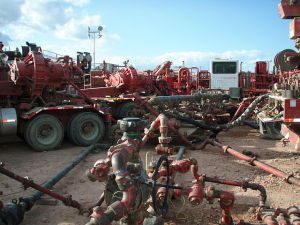
“Halliburton Frack Job in the Bakken” by Joshua Doubek – Own work. Licensed under CC BY-SA 3.0 via Wikimedia Commons.
As you’re reading this, oil and gas companies in 35 states in the US are injecting millions of gallons of chemicals deep into the ground during hydraulic fracturing operations (“fracking”). Similar activities have started in EU, too.
Of the fracking chemicals that scientists have been allowed to study, one in ten are hazardous to humans. Why can’t scientist study all the chemicals used in fracking? Because the oil and gas industry classifies them as “trade secrets.”
People have a right to know what chemicals are possibly leaking into our water supplies, and scientists should be given access to the identity of all fracking chemicals. The Environmental Protection Agency (EPA) is considering a new rule—but who knows if it will happen.
When pundits and politicians go hand in hand with corporations to put a muzzle on scientists, scientists alone can do little to publicly defend their work and reputations. Why? Because science can’t flourish if scientists are afraid to speak out—especially on “hot button” issues like global warming.
The post Aren’t You Worried of Fracking? appeared first on § Author Massimo Marino.

